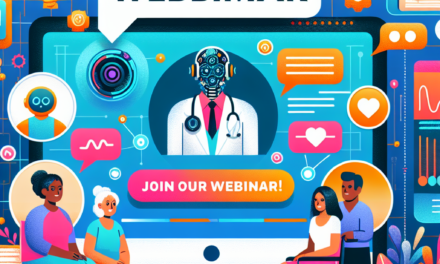NIH Launches Innovative GenAI Tool to Match Volunteers with Clinical Trials
The National Institutes of Health (NIH) has recently unveiled a groundbreaking tool that leverages Generative Artificial Intelligence (GenAI) to enhance the recruitment process for clinical trials. This innovative approach aims to bridge the gap between potential volunteers and the myriad of clinical studies that require participants. As the healthcare landscape evolves, the need for efficient and effective recruitment strategies becomes increasingly critical. This article delves into the significance of this GenAI tool, its operational mechanics, the challenges it addresses, and its potential impact on clinical research.
Understanding the Need for Enhanced Clinical Trial Recruitment
Clinical trials are essential for advancing medical knowledge and developing new treatments. However, one of the most significant challenges faced by researchers is recruiting a sufficient number of participants. The NIH estimates that nearly 80% of clinical trials fail to meet their recruitment goals, leading to delays in research and increased costs. Several factors contribute to this issue:
- Awareness: Many individuals are unaware of ongoing clinical trials that may be relevant to their health conditions.
- Eligibility Criteria: Complex eligibility requirements can deter potential volunteers from participating.
- Trust Issues: Historical mistrust in medical research, particularly among marginalized communities, can hinder recruitment efforts.
- Logistical Barriers: Geographic location, transportation issues, and time constraints can prevent individuals from participating in trials.
Given these challenges, the NIH’s GenAI tool represents a significant advancement in addressing recruitment inefficiencies. By utilizing AI-driven algorithms, the tool aims to streamline the matching process between volunteers and clinical trials, ultimately enhancing participation rates and accelerating research timelines.
How the GenAI Tool Works
The GenAI tool developed by the NIH employs sophisticated algorithms to analyze vast amounts of data from various sources, including electronic health records, patient registries, and clinical trial databases. The primary objective is to identify potential volunteers who meet the specific criteria for ongoing clinical trials. Here’s a closer look at how the tool operates:
- Data Integration: The tool aggregates data from multiple sources, ensuring a comprehensive understanding of patient demographics, health conditions, and treatment histories.
- Natural Language Processing (NLP): Utilizing NLP, the tool can interpret unstructured data, such as clinical notes, to identify relevant health information that may not be captured in traditional databases.
- Machine Learning Algorithms: The tool employs machine learning to continuously improve its matching accuracy by learning from past recruitment successes and failures.
- User-Friendly Interface: Volunteers can easily input their health information and preferences, allowing the tool to provide personalized trial recommendations.
This innovative approach not only enhances the efficiency of the recruitment process but also empowers individuals to take an active role in their healthcare decisions. By providing tailored information about relevant clinical trials, the GenAI tool fosters greater engagement and participation among potential volunteers.
Addressing Barriers to Participation
One of the most significant advantages of the NIH’s GenAI tool is its potential to address various barriers that have historically hindered clinical trial participation. By leveraging technology, the tool can help mitigate these challenges in several ways:
- Increased Awareness: The tool can reach a broader audience by utilizing digital platforms and social media to inform individuals about available clinical trials.
- Personalized Matching: By providing tailored recommendations based on individual health profiles, the tool can help potential volunteers find trials that are more relevant to their specific conditions.
- Building Trust: The NIH is committed to transparency and ethical practices in research. By engaging with communities and addressing historical mistrust, the GenAI tool can help build confidence in clinical trials.
- Logistical Support: The tool can provide information about trial locations, transportation options, and potential compensation for participation, making it easier for individuals to engage.
By addressing these barriers, the GenAI tool not only enhances recruitment efforts but also promotes diversity and inclusivity in clinical research. This is particularly important as diverse representation in clinical trials is crucial for ensuring that new treatments are effective across different populations.
Case Studies: Successful Implementation of AI in Clinical Trials
Several organizations have already begun to explore the use of AI in clinical trial recruitment, providing valuable insights into the potential effectiveness of the NIH’s GenAI tool. Here are a few notable case studies:
- Flatiron Health: This oncology-focused technology company has developed an AI-driven platform that analyzes real-world data to identify eligible patients for clinical trials. Their approach has led to a significant increase in trial enrollment rates, demonstrating the potential of AI in streamlining recruitment.
- Antidote: Antidote is a digital health company that connects patients with clinical trials. By utilizing AI algorithms to match patients with relevant studies, they have successfully increased enrollment rates and improved patient engagement.
- IBM Watson: IBM’s Watson for Clinical Trials uses AI to analyze patient data and identify suitable clinical trials. In a pilot study, the platform was able to match patients with trials 30% faster than traditional methods, showcasing the efficiency of AI-driven recruitment.
These case studies highlight the transformative potential of AI in clinical trial recruitment. By learning from these successful implementations, the NIH can refine its GenAI tool to maximize its impact on clinical research.
The Future of Clinical Trials with GenAI
The launch of the NIH’s GenAI tool marks a significant milestone in the evolution of clinical trial recruitment. As the healthcare landscape continues to evolve, the integration of AI technologies will play a crucial role in shaping the future of clinical research. Here are some potential developments to watch for:
- Enhanced Personalization: Future iterations of the GenAI tool may incorporate even more advanced algorithms to provide highly personalized trial recommendations based on individual health data and preferences.
- Broader Data Sources: As more health data becomes available through electronic health records and wearable devices, the tool could leverage this information to improve matching accuracy and expand its reach.
- Collaboration with Community Organizations: The NIH may partner with community organizations to enhance outreach efforts and build trust within diverse populations, ensuring that clinical trials are representative of the broader population.
- Real-Time Updates: The tool could provide real-time updates on trial availability and eligibility criteria, allowing potential volunteers to stay informed about new opportunities.
As these developments unfold, the NIH’s GenAI tool has the potential to revolutionize the way clinical trials are conducted, ultimately leading to faster research timelines and improved patient outcomes.
Conclusion: A New Era for Clinical Trials
The NIH’s launch of the GenAI tool represents a significant advancement in the field of clinical trial recruitment. By addressing the challenges of awareness, eligibility, trust, and logistics, this innovative tool has the potential to enhance participation rates and promote diversity in clinical research. As demonstrated by successful case studies, the integration of AI technologies can streamline the recruitment process and empower individuals to take an active role in their healthcare decisions.
Looking ahead, the future of clinical trials is poised for transformation. With continued advancements in AI and a commitment to inclusivity and transparency, the NIH’s GenAI tool could pave the way for a new era of clinical research—one that is more efficient, equitable, and responsive to the needs of diverse populations. As we embrace these innovations, we move closer to a future where clinical trials are accessible to all, ultimately leading to better health outcomes for everyone.





